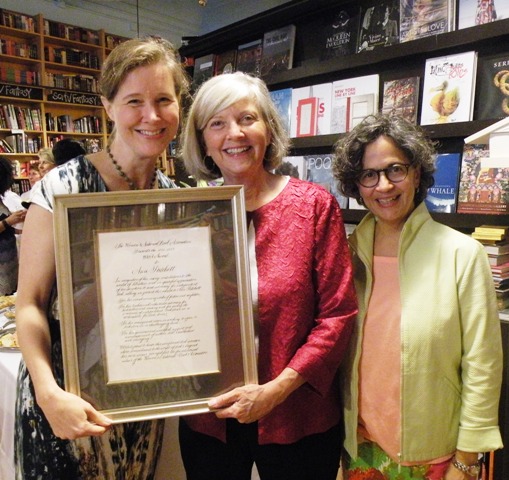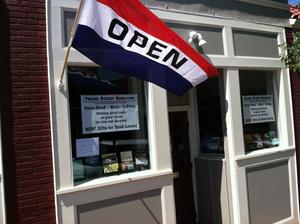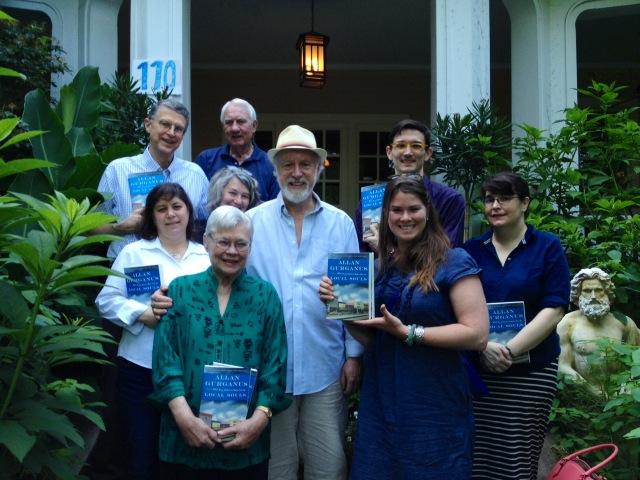 Howard Norman writes in several genres: books for young readers, translated folk tales, scholarly essays and, perhaps most recognizably, novels such as The Bird Artist. I Hate to Leave this Beautiful Place is yet another departure. It's a memoir--but, this being Howard Norman, it's no ordinary memoir. Norman captures five incidents in his life, watershed moments of "arresting strangeness." Far from being an overstatement, those words prove mild once the reader considers some of the events.
Howard Norman writes in several genres: books for young readers, translated folk tales, scholarly essays and, perhaps most recognizably, novels such as The Bird Artist. I Hate to Leave this Beautiful Place is yet another departure. It's a memoir--but, this being Howard Norman, it's no ordinary memoir. Norman captures five incidents in his life, watershed moments of "arresting strangeness." Far from being an overstatement, those words prove mild once the reader considers some of the events.
The first recollection takes place when Norman is 15, enamored of his brother's girlfriend and working in a bookmobile. His mostly absent father, having told the family he is in California, is hanging out in a drugstore across the street from one of the bookmobile stops. Norman wins $666 in a random radio contest; his father immediately seeks him out for his "share." About the girlfriend, the less said the better.
In Halifax, an affair with an older woman causes a beloved older man he calls Uncle to tell him: "Your Mathilde's got bigger appetites for life than you have... she's got a lot of stickers on her steamer trunk." When she is killed in a plane crash, Norman's grief is all-consuming.
In the Canadian Northwest Territories, he meets band members whose entire repertoire consists of the songs of John Lennon. While he is translating Inuit life stories and folk tales, the news arrives that John Lennon is dead. Norman drinks and grieves with the band, heartbroken their idol is gone. He learns of a man turned into a goose by a malevolent shaman. When it is time to fly south, his soulful lament "I hate to leave this beautiful place" is heard at great distances.
The final recollection is very sad. Norman and his wife allow a friend to stay in their D.C. home while they spend time in their Vermont farmhouse, about which he says: "Everything I love most happens most every day." While in their home, the woman brutally kills her young son and herself in their dining room. This horrendous act eventually causes Norman to seek solace among his beloved birds--this time in Point Reyes, Calif.
Each recollection is serious, poignant, filled with meaning for Norman and, in turn, for the reader. What isn't said tells us as much as what is--and all of it is important in order for us to begin to understand this complex, extraordinarily sensitive, caring man and writer. --Valerie Ryan, Cannon Beach Book Company, Ore.
Shelf Talker: A memoir like no other, filled with birds, mysterious occurrences, people we don't meet every day--all overlaid with the poetic sensibility of a master of the written word.
 "Using a smartphone to compare prices to Amazon is downright rude--and it's also missing the point of what indie bookstores can provide. Shoppers who are just looking for a discount won't necessarily find what they are looking for at an indie bookstore. But shoppers who are looking for an experience--real human interaction, booksellers who get to know what kinds of books they like, a community gathering place--they will find what they are looking for. It doesn't involve a smartphone. It involves the real world and fantastic books--not an app on a screen."
"Using a smartphone to compare prices to Amazon is downright rude--and it's also missing the point of what indie bookstores can provide. Shoppers who are just looking for a discount won't necessarily find what they are looking for at an indie bookstore. But shoppers who are looking for an experience--real human interaction, booksellers who get to know what kinds of books they like, a community gathering place--they will find what they are looking for. It doesn't involve a smartphone. It involves the real world and fantastic books--not an app on a screen."







 Following its overwhelming
Following its overwhelming 



 Citing a new Random House advertising campaign "directed at consumers who may never have bought an audiobook but whose hobbies may predispose them to listening to one," the New York Times explored the
Citing a new Random House advertising campaign "directed at consumers who may never have bought an audiobook but whose hobbies may predispose them to listening to one," the New York Times explored the  In Hillsborough, N.C., Tuesday, a group of booksellers gathered at the home of author Allan Gurganus, just before a dinner in Chapel Hill to celebrate his September book, Local Souls (his first work in more than a decade); the event was organized by Norton sales rep Kristin Keith. The group, clockwise from the lower left (and revolving around Gurganus at the center): Nancy Olson (owner, Quail Ridge), Jamie Fiocco (owner, Flyleaf), Erica Eisdorfer (Flyleaf), Tom Campbell (owner, Regulator), Jim Olson (Nancy's husband), Michael Webb (Flyleaf), Stacie Smith (Bull's Head, University of North Carolina), Kimberly Daniels (Country Bookshop).
In Hillsborough, N.C., Tuesday, a group of booksellers gathered at the home of author Allan Gurganus, just before a dinner in Chapel Hill to celebrate his September book, Local Souls (his first work in more than a decade); the event was organized by Norton sales rep Kristin Keith. The group, clockwise from the lower left (and revolving around Gurganus at the center): Nancy Olson (owner, Quail Ridge), Jamie Fiocco (owner, Flyleaf), Erica Eisdorfer (Flyleaf), Tom Campbell (owner, Regulator), Jim Olson (Nancy's husband), Michael Webb (Flyleaf), Stacie Smith (Bull's Head, University of North Carolina), Kimberly Daniels (Country Bookshop).

 Howard Norman writes in several genres: books for young readers, translated folk tales, scholarly essays and, perhaps most recognizably, novels such as The Bird Artist. I Hate to Leave this Beautiful Place is yet another departure. It's a memoir--but, this being Howard Norman, it's no ordinary memoir. Norman captures five incidents in his life, watershed moments of "arresting strangeness." Far from being an overstatement, those words prove mild once the reader considers some of the events.
Howard Norman writes in several genres: books for young readers, translated folk tales, scholarly essays and, perhaps most recognizably, novels such as The Bird Artist. I Hate to Leave this Beautiful Place is yet another departure. It's a memoir--but, this being Howard Norman, it's no ordinary memoir. Norman captures five incidents in his life, watershed moments of "arresting strangeness." Far from being an overstatement, those words prove mild once the reader considers some of the events.